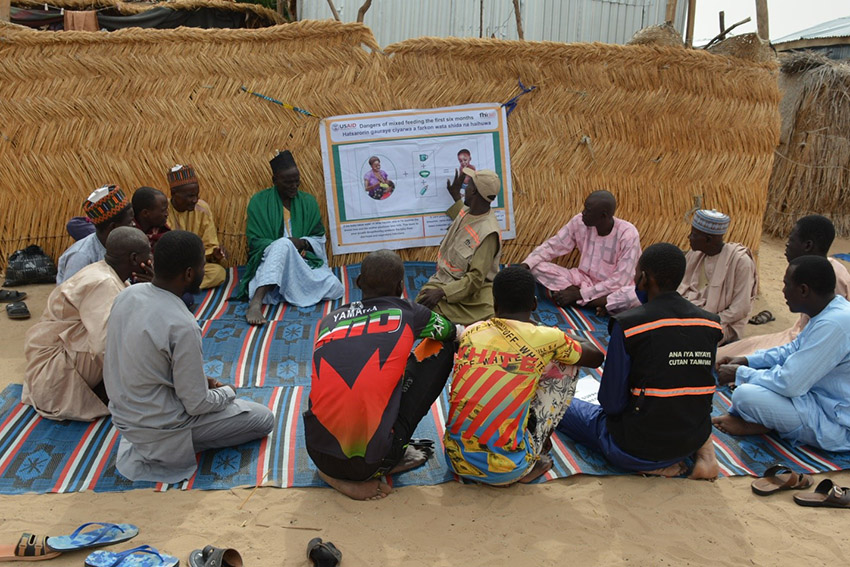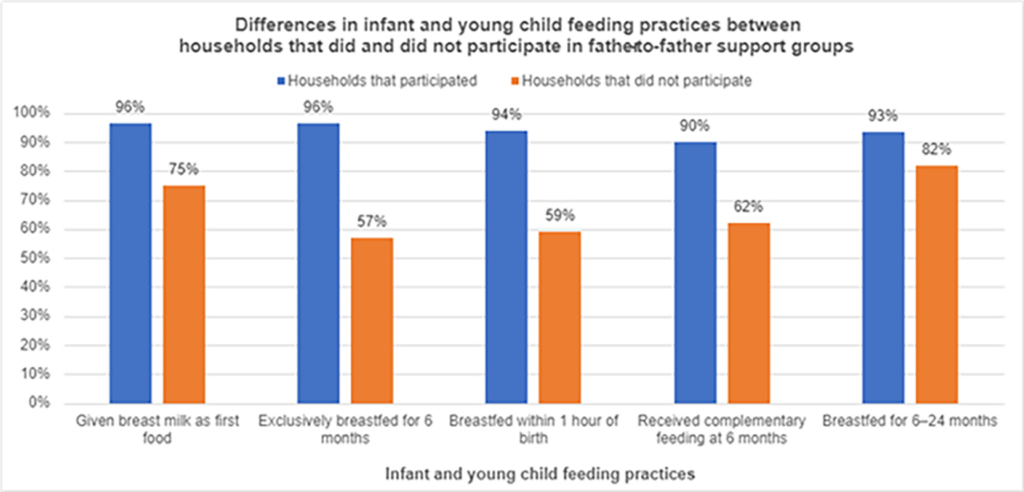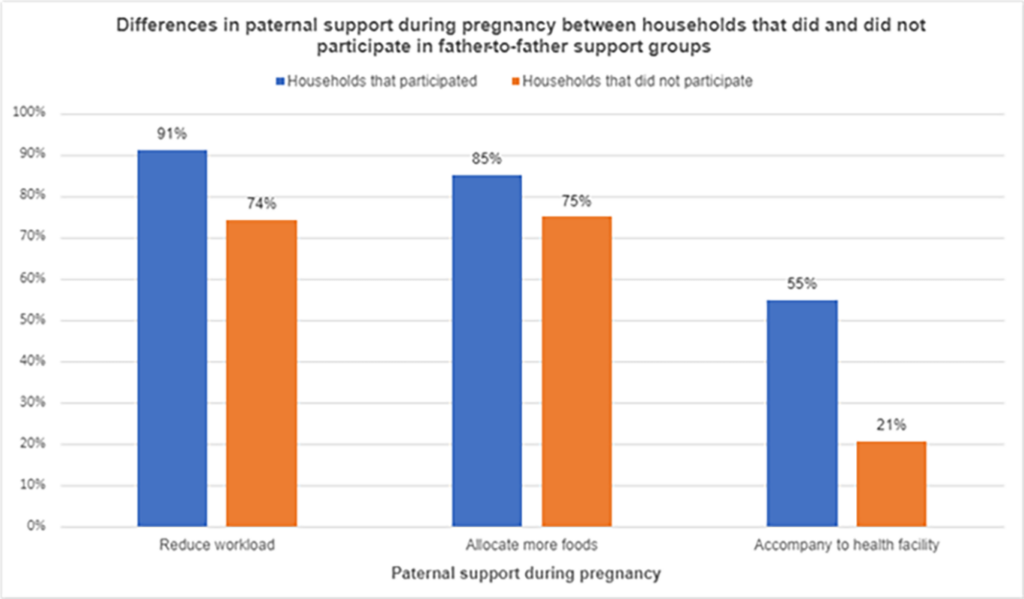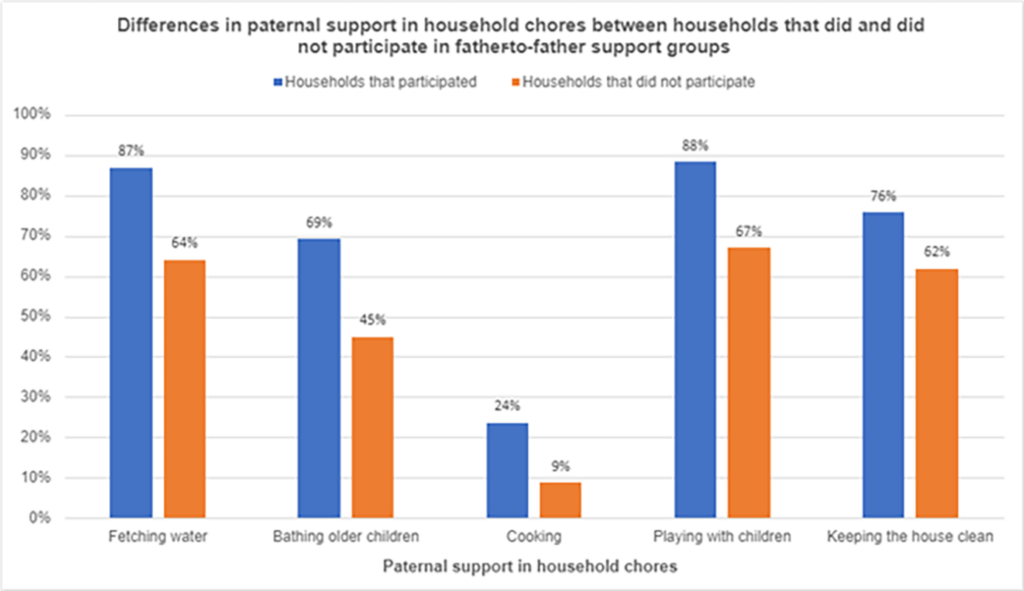
In Borno State, Nigeria, men participate in a father-to-father support group that discussed topics such as breastfeeding, improving maternal nutrition and contributing to household chores. Fathers’ support is vital to the well-being of mothers, newborns and children. Photo credit: Onwe Uchenna N/FHI 360
Undernutrition is associated with 45% of child deaths worldwide, according to the World Health Organization. Supporting women who are able to breastfeed is essential to preventing child deaths. More than 820,000 children under 5 years old could be saved each year if all children were optimally breastfed in their first two years of life. The importance of fathers’ support in this endeavor cannot be understated.
A 2022 analysis conducted by FHI 360 and the Bureau for Humanitarian Assistance at the U.S. Agency for International Development (USAID) in Borno State, Nigeria, found that participation in father-to-father support groups yielded positive results.
Encouraging fathers’ participation in infant and young child nutrition
Nutrition in northeast Nigeria has deteriorated significantly since the onset of a humanitarian crisis in 2009. Violent conflict, increased food prices, low harvest, and disease outbreaks have caused people to flee their homes and not have access to consistent, adequate nutrition, causing undernutrition to spike. Undernutrition in northeast Nigeria’s Borno State is further exacerbated by cultural barriers to recommended nutrition practices, especially breastfeeding, including misconceptions that infants need water or that formula is superior to breast milk.
Because men in Borno State are commonly regarded as the decision-makers for their families, they have deep influence on maternal and child well-being. That’s why FHI 360 established nearly 484 father-to-father support groups through the Integrated Humanitarian Assistance to Northeast Nigeria (IHANN) IV project, funded by USAID. The groups provided fathers with health information to better support their families.
A look inside the father-to-father support groups
Each group was led by a trained male facilitator. The 15 participants met in person twice per month. Meetings centered on topics like hygiene, early initiation to breastfeeding, and maternal nutrition. Participants were also encouraged to support their families by doing household chores.
“The knowledge I acquired during my participation in the support group has improved my life […] by ensuring I provide food varieties to my family to meet their nutritional needs, ensure any child [of mine] that is sick is presented to the health facility immediately and support my wife to breastfeed our children by reducing her workload,” says Modu Ali, a support group participant.
Increased paternal engagement results in behavior changes
In families participating in father-to-father support groups, more mothers began breastfeeding within the first hour after birth, providing breast milk as the first food, exclusively breastfeeding for six months and practicing complementary feeding (introducing other foods and liquids alongside breast milk, optimally at six months).
Over 96% of the households in which fathers participated in support groups practiced exclusive breastfeeding for the first six months, compared with 57% of households that did not participate in the groups (see Figure 1).

Figure 1: Differences in infant and young child feeding practices between households that did and did not participate in IHANN IV father-to-father support groups.
Mallam Abatcha, a support group participant, had previously discarded colostrum (the first breast milk produced after birth), believing it “makes babies sick and interferes with their growth.” In his group, he learned that colostrum is full of important nutrients for infants.
Participants in father-to-father support groups also changed other behaviors, such as assisting mothers during pregnancy.
“Back in our village, we never knew that women have to visit the hospital when they are pregnant,” says support group participant Tamshi Abatcha. “Now, we even accompany our wives to attend antenatal care and make sure they take their routine medicines.”
The number of support-group households in which women had their husbands accompany them to health facilities during pregnancy was more than double the number of the non-support group households.
Cultural norms that position men as the primary decision-makers in their households may discourage them from engaging in daily child care or household chores traditionally performed by women. Fathers who participated in the support groups were more likely to help with household chores (see Figure 2).

Figure 2: Differences in paternal support during pregnancy between households that did and did not participate in IHANN IV father-to-father support groups
The greatest increase came with cooking: Fathers who had participated in the support groups helped with cooking nearly three times more than fathers who had not participated in the groups. We also saw more fathers from support-group households helping with bathing older children, fetching water and playing with children (see Figure 3). This helps take some of the burden off their wives, who may experience increased fatigue while pregnant or breastfeeding.

Figure 3: Differences in paternal support in household chores between households that did and did not participate in IHANN IV father-to-father support groups.
Implementing father-to-father support groups more widely
Father-to-father support groups work. The findings from FHI 360’s IHANN IV project show that households in which fathers participated in the groups more consistently supported mothers during pregnancy and performed recommended practices for feedings infants and young children.
Establishing additional support groups throughout the world could help ensure that critical information reaches more fathers so they can encourage healthy feeding practices. Infant and young child nutrition programs, especially in regions where men are considered the primary decision-makers for their families, should strongly consider integrating father-to-father support groups into their activities.
